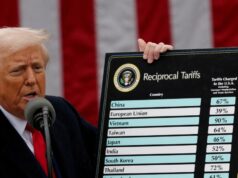WASHINGTON: The Biden administration will impose new restrictions on firearms exports and increase scrutiny on transactions to check diversions of guns to drug cartels, criminal groups, gangs and others, the Commerce Department said on Friday.
“The days of exporting military-style weapons to civilians in unstable countries are over,” Commerce Secretary Gina Raimondo told Reuters. “Under our new review process, it will be much harder to export these weapons to civilians in countries that pose national security risks.”
The department on October 27 issued a pause on most firearm exports to assess the “risk of firearms being diverted to entities or activities that promote regional instability, violate human rights, or fuel criminal activities.”
The department announced on Friday it will lift the pause from May 30 when the new restrictions take effect. They are being imposed because the department believes it needs to do more to prevent exported firearms from being diverted for malign purposes and harming U.S. national security.
The new interim final rule imposes restrictions on exports to non-governmental users in 36 countries where the State Department has determined they are at high risk of diversions or misuse. The department will apply a “presumption of denial for commercial transactions” in those countries.
The Commerce Department expects the restrictions tied to the 36 countries to result in about a 7% reduction, or $40 million, out of the $600 million in average annual U.S. firearm exports. The department will revoke some export licenses and will cut some from four years to one-year licenses, the Commerce Department said.
The 36 countries include some former Soviet Republics, the Commerce Department official added, saying it is “increasing scrutiny on a transaction by transaction level to ensure that firearms aren’t exported to destinations of concern.”
The October 27 pause on export licenses for firearms and ammunition sales to non-governmental users had some exemptions, including export licenses for Ukraine and Israel, and some other close allies.
In November, 46 Republican senators said they had “significant concerns” about the pause, saying it “puts at stake U.S. commercial and economic interests” as well as U.S. national security and foreign policy. A similar letter was sent by House Republicans.
(REUTERS)
In a career spanning three decades and counting, Ramananda (Ram to his friends) has been the foreign editor of The Telegraph, Outlook Magazine and the New Indian Express. He helped set up rediff.com’s editorial operations in San Jose and New York, helmed sify.com, and was the founder editor of India.com.
His work has featured in national and international publications like the Al Jazeera Centre for Studies, Global Times and Ashahi Shimbun. But his one constant over all these years, he says, has been the attempt to understand rising India’s place in the world.
He can rustle up a mean salad, his oil-less pepper chicken is to die for, and all it takes is some beer and rhythm and blues to rock his soul.
Talk to him about foreign and strategic affairs, media, South Asia, China, and of course India.





